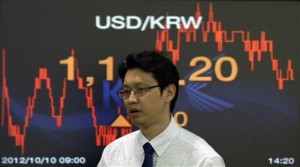World stocks flat ahead of ‘fiscal cliff’ deadline
BANGKOK — World stock markets were mostly flat in thin trading Monday, as hopes faded for a budget deal by the end of the year that would prevent the US from reaching the “fiscal cliff.”
Markets have been on edge as President Barack Obama and Republican leaders squabble over how to reduce the US government’s budget deficit. Neither house of Congress is expected to meet again until after Christmas.
It’s not clear how the two sides might reach a deal before Jan. 1, when automatic government spending cuts and tax increases are set to kick in if no deal is in place. Those changes, worth hundreds of billions of dollars, threaten to throw the world’s No. 1 economy back into recession.
Britain’s FTSE 100 rose 0.2 percent to 5,910.12. France’s CAC-40 was marginally lower at 3,660.30. Wall Street was poised to open lower, with Dow Jones industrial futures down 0.5 percent to 13,075 and S&P 500 futures shedding 0.6 percent to 1,417.60.
In Asia, Hong Kong’s Hang Seng, which opened lower, swung into positive territory to post a 0.1 percent gain and close at 22,531.51 after a half-day of trading.
South Korea’s Kospi rose less than 0.1 percent to 1,981.82. Australia’s S&P/ASX 200 added 0.3 percent to 4,635.20, largely on the back of gains in resource shares.
Japanese and German markets were closed for a public holiday. Among stock markets that will close early Monday for Christmas Eve, include those in the US, Australia and New Zealand.
Among individual stocks, Cathay Pacific Airways rose 1.4 percent, days after flight attendants at the Hong Kong-based carrier settled a labor dispute. Australian mining contractor Macmahon Holdings plunged 4.3 percent.
Rising gold prices on Friday helped shares linked to the precious metal. Hong Kong-based Zijin Mining Group, China’s largest gold miner, rose 2.4 percent. Australian gold miner Newcrest Mining gained 1 percent.
Benchmark crude for February delivery fell 14 cents to $88.52 per barrel in electronic trading on the New York Mercantile Exchange.
On Friday, investors took money out of oil and other energy commodities, a sign that they expect the economy to slow. The contract for February delivery fell $1.47 to finish at $88.66 per barrel in New York, the contract’s lowest point in three weeks.
In currencies, the euro rose to $1.3218 from $1.3176 late Friday in New York. The dollar rose to 84.42 yen from 84.23 yen.
